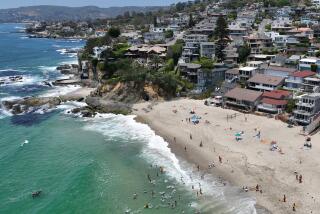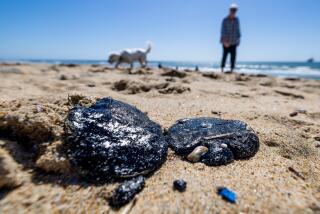At a Beach Under Siege, Residents Wait and Worry
- Share via
Just after dawn Thursday, they began to gather. Some would stay for an hour or so; some stayed much of the day. They stood alone or in small clusters, engaged in quiet conversation or peering curiously at news crews.
These were the residents of Huntington Beach, a city of 186,000 that grew up with precious oil wells in its back yards and now was facing the prospect of oil on its beach.
Knowing they were powerless to stop it, they came to the shoreline anyway--fearing what the 4 1/2-mile-wide, 2-mile-long patch of oil, still a couple of miles offshore, could do to this picture postcard day.
By 5 p.m., long after much of the crowd had gone home, the fears finally began to materialize.
What had been just a foul odor when the spill was first reported Wednesday turned into something palpable. The first oil--a light brownish foam--washed up on the shore north of the Huntington Beach Pier in the Huntington Bluffs area near Golden West Street and Pacific Coast Highway.
Huntington Beach Mayor Tom Mays provided the first confirmation of the onshore arrival at a 6 p.m. press conference, describing the solution as having “a faint oily smell” and similar in appearance to the foam in a kitchen sink after washing a frying pan.
A TV reporter, who went down to the waterline to assess the damage, yelled to his producer: “You can’t see the damn stuff. This isn’t like asphalt, you know.”
But the light appearance of the first oil to wash ashore did not ease people’s minds. “We’re desecrating something very beautiful here,” said Pat Hickey, 57, a Huntington Beach resident since 1968. “That ocean is beautiful and free, and now we’re going to kill it.”
Thursday night, a sense of foreboding seemed to grip beach residents. Twenty-four hours before, they wondered whether the oil would reach the shore. Now there was no doubt. More answers would come with the light of dawn on Friday.
On Thursday, the nation came abruptly to Huntington Beach. By mid-morning, satellite dishes dotted the beach walkway near Pacific Coast Highway and 1st Street. Cable News Network and local and network television crews were broadcasting from the water’s edge. Average citizens found themselves brushing elbows with state and local politicians who held press conferences, almost one after another.
As the politicians talked, some of the crowd sat on blankets, but most stood. A few had binoculars. Some had home video cameras. But almost uniformly, they maintained an eerily constant gaze out to sea, waiting to see something they all said they hoped they wouldn’t see.
No one was allowed in the ocean, though the two- to four-foot waves made for a good surfing day. One 19-year-old man intent on surfing ignored several requests to get out of the water and was arrested.
“We’re trying to keep people out of the water as a precaution,” lifeguard Claude Panis said. “A lot of surfers are upset because they don’t see any oil and we have good waves today.”
Perhaps more so than others, the lifeguards seemed to cherish the beauty of the coastline. “As a lifeguard, surfer and beach lover, I’m a little mad this happened,” Panis said. “But it might be another thing the environmentalists can use as ammunition, so in a way, maybe it’ll be a good thing.”
In the early afternoon, an airplane made a couple of passes carrying a banner that read: “Valdez Was Enough--Please Keep America Clean.”
While many in the crowd were regular beach-goers, some made a special effort to see firsthand what was happening.
Leslee Seward said her family watched news broadcasts of the spill and decided to do something to help. She took her three sons--ages 12, 8 and 5--out of school so they could join the volunteer effort to find any birds that might have been caught in the spill.
“I wanted to show the kids how dangerous it is, that it kills the environment,” Seward said. “I took them out of school because I feel this is a lesson in itself.”
Guenther Franz and his wife were visiting California and said they came upon the beach somewhat by accident after taking a wrong turn while driving. But as they learned of the spill, it struck a responsive chord; the Franzes live on the shore of Lake Superior in Michigan.
“The fact is accidents will happen, but what makes me suspicious is what are they doing in the future with these freighters?” Franz asked. “Why do we have to wait years to solve the problem?”
Some in the crowd felt they were watching something potentially historic. Paul Englebright brought a home video camera to film the scene. But with little happening, he used most of his videotape on TV news crews or the crowd itself. And what if the oil actually were to wash on shore? “I have another roll of tape,” he said.
But others said they came to help their hometown. “I think it’s a sense of community,” said Sharon Laraway, 42. “This is our home. Our children play here. We came down to help the wildlife.”
Noting the crowd’s seemingly somber mood, she said, “I think there’s a sense of sadness and outrage, especially since the Valdez trial is just beginning,” a reference to the criminal trial in Alaska of Exxon Valdez Capt. Joseph Hazelwood.
The mood likely would have been more anxious had the onlookers been in closer touch with state wildlife officials two miles away. Using a lifeguard station at Pacific Coast Highway and Magnolia Street as a bird hospital, officials had collected about 25 birds by late Thursday afternoon, eight dead.
The others were washed off with a mild dish soap and warmed up, the antidote to the oil that damages their ability to control their body temperature.
Wildlife officials said that when volunteers began showing up before dawn, each was given a box and plastic gloves and sent off in search of injured birds. Officials expect to find many more birds in the days ahead.
“This is just the tip of the iceberg,” lifeguard Lon Graham said.
Although oil spills in California are always big news--TV crews from San Diego and Phoenix were on hand--the colorful history of Huntington Beach no doubt contributed to the media blitz.
The city, popularized as the quintessential “Surf City” both in song and folklore, has served as the site for countless surfing competitions. Its nine miles of beaches and 85-year-old pier--now scheduled to be razed and rebuilt--helped shape the rest of the country’s mythical view of California as the land of eternal sunshine.
As the day wore on, the crowd began to dissipate like an early-morning fog.
But Jim Kahl, 30, a Huntington Beach contractor, was there all day with his 4-year-old son.
Someone asked if the vigil had been worthwhile. “Absolutely,” Kahl said. “This beach is very important to me and my son. We want to be able to use it in future years.”
More to Read
Sign up for Essential California
The most important California stories and recommendations in your inbox every morning.
You may occasionally receive promotional content from the Los Angeles Times.













